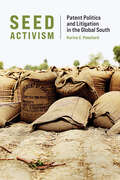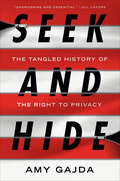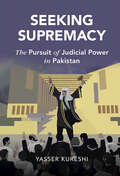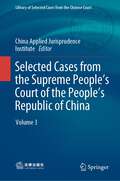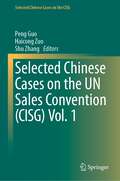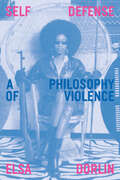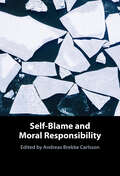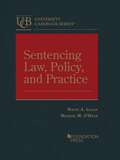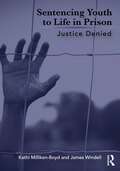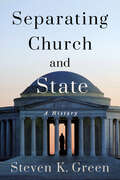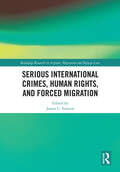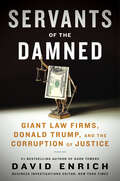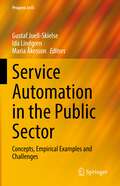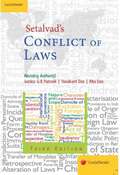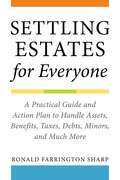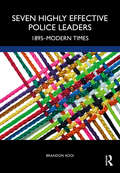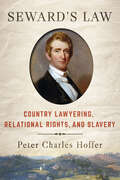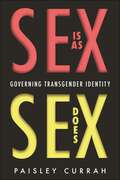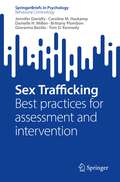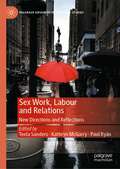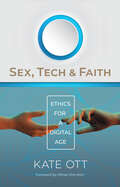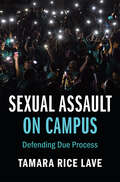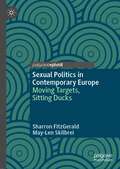- Table View
- List View
Seed Activism: Patent Politics and Litigation in the Global South (Food, Health, and the Environment)
by Karine E. PeschardHow lawsuits around intellectual property in Brazil and India are impacting the patentability of plants and seeds, farmers&’ rights, and the public interest.Over the past decade, legal challenges have arisen in the Global South over patents on genetically modified crops. In this ethnographic study, Karine E. Peschard explores the effects of these disputes on people&’s lives, while uncovering the role of power—material, institutional, and discursive—in shaping laws and legal systems. The expansion of corporate intellectual property (IP), she shows, negatively impacts farmers&’ rights and, by extension, the right to food, since small farms produce the bulk of food for domestic consumption. Peschard sees emerging a new legal common sense concerning the patentability of plant-related inventions, as well as a balance among IP, farmers&’ rights, and the public interest.Peschard examines the strengthening of IP regimes for plant varieties, the consolidation of the global biotech industry, the erosion of agrobiodiversity, and farmers&’ dispossession. She shows how litigants question the legality of patents and private IP systems implemented by Monsanto for royalties on three genetically modified crop varieties, Roundup Ready soybean in Brazil and Bt cotton and Bt eggplant in India. Peschard argues that these private IP systems have rendered moot domestic legislation on plant variety protection and farmers&’ rights. This unprecedented level of corporate concentration in such a vital sector raises concerns over the erosion of agricultural biodiversity, farmers&’ rights and livelihoods, food security, and, ultimately, the merits of extending IP rights to higher life forms such as plants.
Seek and Hide: The Tangled History of the Right to Privacy
by Amy Gajda&“This brilliant and thought-provoking book shows how America&’s well-known emphasis on freedom of the press has long been balanced by a deep legal tradition that protects an individual&’s right to privacy. Amy Gajda shows how battles over the right to privacy are nothing new, but they are particularly relevant in this era of digital media and social networks.&”—Walter Isaacson, author of Steve JobsAn urgent book for today's privacy wars: the surprising history of the fitful development of the right to privacy—and its battle against the public&’s right to know.The battle between an individual&’s right to privacy and the public&’s right to know has been fought for centuries. The founders demanded privacy for all the wrong press-quashing reasons. Supreme Court justice Louis Brandeis famously promoted First Amendment freedoms but argued strongly for privacy too; and presidents from Thomas Jefferson through Donald Trump confidently hid behind privacy despite intense public interest in their lives. Today privacy seems simultaneously under siege and surging. And that&’s doubly dangerous, as legal expert Amy Gajda argues. Too little privacy can mean extraordinary profits and power for people who deal in and publish soul-crushing secrets. Too much means the famous and infamous can cloak themselves in secrecy. Seek and Hide carries us from the very start, when privacy concepts first entered American law and society, to now, when the law allows a Silicon Valley titan to destroy a media site like Gawker out of spite. Muckraker Upton Sinclair, like Nellie Bly before him, pushed the envelope of privacy and propriety and then became a privacy advocate when journalists used the same techniques against him. By the early 2000s we were on our way to today&’s full-blown crisis in the digital age, worrying that smartphones, webcams, basement publishers, and the forever internet had erased the right to privacy completely. Should everyone have privacy in their personal lives? Can privacy exist in a public place? Is there a right to be forgotten even in the United States? Is it too late to get control of data privacy? This fascinating and necessary book shows us how the answers may not be what you expect, or hope, how technology makes these issues more complicated than ever before, and how we can learn from the mistakes of the past as we try to balance privacy and First Amendment freedoms in a modern age.
Seeking Supremacy: The Pursuit of Judicial Power in Pakistan (Cambridge Studies in Law and Society)
by Yasser KureshiThe emergence of the judiciary as an assertive and confrontational center of power has been the most consequential new feature of Pakistan's political system. This book maps out the evolution of the relationship between the judiciary and military in Pakistan, explaining why Pakistan's high courts shifted from loyal deference to the military to open competition, and confrontation, with military and civilian institutions. Yasser Kureshi demonstrates that a shift in the audiences shaping judicial preferences explains the emergence of the judiciary as an assertive power center. As the judiciary gradually embraced less deferential institutional preferences, a shift in judicial preferences took place and the judiciary sought to play a more expansive and authoritative political role. Using this audience-based approach, Kureshi roots the judiciary in its political, social and institutional context, and develops a generalizable framework that can explain variation and change in judicial-military relations around the world.
Sein und Zahl: Ethik in der Künstlichen Intelligenz für Ingenieur*innen (erfolgreich studieren)
by Monika GattKünstliche Intelligenz, der Transhumanismus fordert die Menschen in ganz neuer Weise heraus. Wir brauchen eine neue, interdisziplinäre Ethik. Sprachsensible Software wie Siri und Alexa werden in unseren Lebensalltag integriert, im autonomen Fahren werden Entscheidungen über Leben und Tod einer künstlichen Intelligenz übertragen. Durch die Aufzeichnung von menschlichem Verhalten soll die Kommunikation mit Verstorbenen ermöglicht werden. Wie stehen wir ethisch zu maschine learning? Wer trägt die Verantwortung? Was darf KI? Um diese Frage zu beantworten, werden in Sein und Zahl ethische und moralische Grundbegriffe wie die Unantastbarkeit menschlicher Würde, Freiheit und Pflichten in Beziehung zu den großen aktuellen Themen der Ingenieurswissenschaften gesetzt.
Selbstbestimmung, Privatheit und Datenschutz: Gestaltungsoptionen für einen europäischen Weg (DuD-Fachbeiträge)
by Marit Hansen Michael Friedewald Michael KreutzerIn diesem Open-Access-Sammelband werden die aktuelle Herausforderungen für Privatheit und Datenschutz aufgezeigt, die durch die zunehmende Digitalisierung entstehen. Die Beitragsautoren analysieren, wie diese durch Governancemechanismen adressiert werden können. Als Alternative zu einem rein profitorientierten Digitalkapitalismus bzw. Digitalautoritarismus wird für einen eigenständigen europäischen Weg beim Datenschutz argumentiert, der auf eine gemeinwohlorientierte Technikentwicklung abzielt. Insbesondere befassen sich die Beiträge mit den Möglichkeiten für die Stärkung der Selbstbestimmung in der Datenökonomie und mit algorithmischen Entscheidungssystemen.
Selected Cases from the Supreme People’s Court of the People’s Republic of China: Volume 3 (Library of Selected Cases from the Chinese Court)
by Feng Zhu Hongyu Han Qiujing MaThis book includes guiding cases of the Supreme People’s Court, cases deliberated at the Adjudication Committee of the Supreme People’s Court, and cases discussed at the Joint Meetings of Presiding Judges from various tribunals. This book is divided into three sections, including Cases by Justices, Cases at the Adjudication Committee and Typical Cases, which will introduce readers to Chinese legal process, legal methodology and ideology in an intuitive, clear and accurate manner. This volume presents cases selected by the trial departments of the Supreme People’s Court of China from their concluded cases. In order to give full weight to the legal value and social function of cases from the Supreme People’s Court, and to achieve the goal of serving trial practices, serving economic and social development, serving legal education and legal scholarship, serving the rule of law in China, the China Applied Jurisprudence Institute, with the approval of the Supreme People’s Court, opts to publish Selected Cases from the Supreme People’s Court of the People’s Republic of China in both Chinese and English, for domestic and overseas distribution.
Selected Chinese Cases on the UN Sales Convention (Selected Chinese Cases on the CISG)
by Peng Guo Haicong Zuo Shu ZhangThis book focuses on Chinese cases on the CISG decided by Chinese courts of all levels, mainly from 1990 to 2005. During this period, the number of cases grew gradually. The total number of cases remained low, the reasons of which might be the following: parties were not familiar with the CISG hence decided to opt out of it; the case collection and report systems in China at that time were not as developed as now rendering many cases inaccessible. This book deals with the cases in the early days of the development of the CISG in China. These cases reflect how People’s Court of all levels started to deal with various issues arising from the CISG and will help understand whether and how the People’s Courts change their approaches to the interpretation and application of the CISG in the future.
Self Defense: A Philosophy of Violence
by Elsa DorlinA brilliant study of violent self-defense in the struggle for liberation by an award-winning philosopherIs violent self-defense ethical? In the history of colonialism, racism, sexism, capitalism, there has long been a dividing line between bodies "worthy of defending" and those who have been disarmed and rendered defenseless. In 1685, for example, France's infamous "Code Noir" forbade slaves from carrying weapons, under penalty of the whip. In nineteenth-century Algeria, the colonial state outlawed the use of arms by Algerians, but granted French settlers the right to bear arms. Today, some lives are seen to be worth so little that Black teenagers can be shot in the back for appearing "threatening" while their killers are understood, by the state, to be justified. That those subject to the most violence have been forcibly made defenseless raises, for any movement of liberation, the question of using violence in the interest of self-defense.Here, philosopher Elsa Dorlin looks across the global history of the left - from slave revolts to the knitting women of the French Revolution and British suffragists' training in ju-jitsu, from the Warsaw Ghetto Uprising to the Black Panther Party, from queer neighborhood patrols to Black Lives Matter, to trace the politics, philosophy, and ethics of self defense. In this history she finds a "martial ethics of the self": a practice in which violent self defense is the only means for the oppressed to ensure survival and to build a liveable future. In this sparkling and provocative book, drawing on theorists from Thomas Hobbes to Fred Hampton, Frantz Fanon to Judith Butler, Michel Foucault to June Jordan, Dorlin has reworked the very idea of modern governance and political subjectivity.Translated from the French by Kieran Aarons.
Self-Blame and Moral Responsibility
by Andreas Brekke CarlssonSelf-blame is an integral part of our lives. We often blame ourselves for our failings and experience familiar unpleasant emotions such as guilt, shame, regret, or remorse. Self-blame is also what we often aim for when we blame others: we want the people we blame to recognize their wrongdoing and blame themselves for it. Moreover, self-blame is typically considered a necessary condition for forgiveness. However, until now, self-blame has not been an integral part of the theoretical debate on moral responsibility. This volume presents twelve new essays by leading moral philosophers, who set out bold new theories of the nature and ethics of self-blame, and the interconnection between self-blame and moral responsibility. The essays cast new light on traditional problems in the debate on moral responsibility and open new, exciting avenues for research in moral philosophy, moral psychology and the philosophy of punishment.
Sentencing Law, Policy, and Practice (UNIVERSITY CASEBOOK SERIES®)
by Wayne Logan Michael O'HearWith guilt in the vast majority of criminal cases now resolved by guilty pleas, sentencing is a matter of surpassing importance in the American criminal process. Reflecting its significance, the sentencing phase has been buffeted by successive waves of reform efforts, complicating an already challenging topic for law students and instructors alike. Sentencing Law, Policy, and Practice covers this terrain in a manner that is comprehensive, nuanced, and accessible. Coverage includes core sentencing topics, such as the purposes of punishment, constitutional limitations on punishment, sentencing guidelines, and the disparate treatment of defendants, as well as in-depth coverage of other critically important subjects that often receive only glancing treatment in sentencing casebooks―community supervision, economic sanctions, capital punishment, and collateral consequences. The book takes a multi-disciplinary approach, frequently drawing upon cutting-edge legal and social science research, providing opportunities for students to analyze and discuss topics in new and often provocative ways. The text has sufficient breadth and depth for use in a three-credit course but is also readily adaptable for use in a two-credit format.
Sentencing Youth to Life in Prison: Justice Denied
by James Windell Kathi Milliken-BoydThis book analyzes the impact of the U.S. Supreme Court rulings deeming juvenile life without parole (LWOP) sentences to be cruel and unusual punishment. These Court decisions brought about controversy and resistance in the criminal justice field, while at the same time providing hope for those 2,300 people who never thought they had a chance to experience life as an adult outside prison. By looking in depth at the lives of some of the individuals serving life terms, and understanding both the prosecutors who oppose review and resentencing of juvenile lifers and those who are sincerely following the Supreme Court’s guidelines, this book provides a comprehensive understanding of the issues – as well as the people – involved in the sentencing (and potential resentencing) of juveniles to life without the possibility of parole. The authors provide unique, perceptive and straightforward profiles on some of the prisoners who were ultimately sentenced to LWOP after being involved in criminal offenses committed before their 18th birthdays. The book poignantly features the experiences of young people who did not commit a murder yet were still sentenced to life terms, but also delves into the perspectives of the families of victims of juvenile offenders, prosecutors on both sides of the issue, psychologists who have interviewed many of the juvenile lifers and advocates for change in the way juveniles are treated by the criminal justice system. The decisions in Miller v. Alabama and Montgomery v. Louisiana clearly demonstrated that the Court’s view of juveniles evolved over decades to reflect advances in our understanding of the unique characteristics of youth and their involvement in juvenile crimes. This book takes the position that the sentence of life without the possibility of parole for youth is wasteful of both human lives and scarce public resources. The authors write about the human concerns on both sides of the question, and, ultimately, allow readers to make their own decisions about how society should best handle juvenile offenders. This engaging ethnographic treatment will appeal to students and scholars of criminology, corrections, juvenile justice, and delinquency; practitioners working in social policy; and all those interested in a criminal justice system capable of positive outcomes for involved youth.
Separating Church and State: A History (Religion and American Public Life)
by Steven K. GreenSteven K. Green, renowned for his scholarship on the separation of church and state, charts the career of the concept and helps us understand how it has fallen into disfavor with many Americans. In 1802, President Thomas Jefferson distilled a leading idea in the early American republic and wrote of a wall of separation between church and state. That metaphor has come down from Jefferson to twenty-first-century Americans through a long history of jurisprudence, political contestation, and cultural influence. This book traces the development of the concept of separation of church and state and the Supreme Court's application of it in the law. Green finds that conservative criticisms of a separation of church and state overlook the strong historical and jurisprudential pedigree of the idea. Yet, arguing with liberal advocates of the doctrine, he notes that the idea remains fundamentally vague and thus open to loose interpretation in the courts. As such, the history of a wall of separation is more a variable index of American attitudes toward the forces of religion and state. Indeed, Green argues that the Supreme Court's use of the wall metaphor has never been essential to its rulings. The contemporary battle over the idea of a wall of separation has thus been a distraction from the real jurisprudential issues animating the contemporary courts.
Serious International Crimes, Human Rights, and Forced Migration (Routledge Research in Asylum, Migration and Refugee Law)
by James C. SimeonThis volume elucidates and explores the interrelationships and direct causal connection between serious international crimes, serious breaches to fundamental human rights, and gross affronts to human dignity that lead to mass forced migration. Forced migration most often occurs in the context of protracted armed conflict of a noninternational nature where terrorism, fierce fighting, deep animosity, tit-for-tat retaliation, and “rapid dominance” doctrine all lead to the commission of atrocity crimes. Accordingly, this volume makes a valuable contribution to the literature and to the cause of trying to resolve mass forced displacement at its root cause, to explore the course that it takes, and how it might be prevented. The collection comprises original research by leading legal scholars and jurists focusing on the three central themes of serious international crimes, human rights, and forced migration. The work also includes a Foreword from Sir Howard Morrison, QC, former President of the Appeals Division of the International Criminal Court. The book will be a valuable resource for students, academics, researchers, and policymakers working in the areas of international law, migration, human rights, and international criminal law.
Servants of the Damned: Giant Law Firms, Donald Trump, and the Corruption of Justice
by David EnrichNational Bestseller"A powerful and important picture of how mega law firms distort justice."—David Cay Johnston, Washington PostThe NYT's Business Investigations Editor reveals the dark side of American law: Delivering a "devastating" (Carol Leonnig) exposé of the astonishing yet shadowy power wielded by the world’s largest law firms, David Enrich traces how one firm shielded opioid makers, gun companies, big tobacco, Russian oligarchs, Fox News, the Catholic Church, and much of the Fortune 500; helped Donald Trump get elected, govern, and evade investigation; masterminded the conservative remaking of the courts . . . and make a killing along the way.In his acclaimed #1 bestseller Dark Towers, David Enrich presented the never-before-told saga of how Deutsche Bank became the global face of financial recklessness and criminality. Now Enrich turns his eye towards the world of “Big Law” and the nearly unchecked influence these firms wield to shield the wealthy and powerful—and bury their secrets. To tell this story, Enrich focuses on Jones Day, one of the world’s largest law firms. Jones Day’s narrative arc—founded in Cleveland in 1893, it became the first law firm to expand nationally and is now a global juggernaut with deep ties to corporate interests and conservative politics—is a powerful encapsulation of the changes that have swept the legal industry in recent decades.Since 2016, Jones Day has been in the spotlight for representing Donald Trump and his campaigns (and now his PACs)—and for the fleet of Jones Day attorneys who joined his administration, including White House Counsel Don McGahn. Jones Day helped Trump fend off the Mueller investigation and challenged Obamacare. Its once and future lawyers defended Trump’s Muslim ban and border policies and handled his judicial nominations. Jones Day even laid some of the legal groundwork for Trump to challenge the legitimacy of the 2020 election.But the Trump work is but one chapter in the firm’s checkered history. Jones Day, like many of its peers, have become highly effective enablers of the business world’s worst misbehavior. The firm has for decades represented Big Tobacco in its fight to avoid liability for its products. Jones Day worked tirelessly for the Catholic Church as it tried to minimize its sexual-abuse scandals. And for Purdue Pharma, the maker of OxyContin, as it sought to protect its right to make and market its dangerously addictive drug. And for Fox News as it waged war against employees who were the victims of sexual harassment and retaliation. And for Russian oligarchs as their companies sought to expand internationally.In this gripping and revealing new work of narrative nonfiction, Enrich makes the compelling central argument that law firms like Jones Day play a crucial yet largely hidden role in enabling and protecting powerful bad actors in our society, housing their darkest secrets, and earning billions in revenue for themselves.
Service Automation in the Public Sector: Concepts, Empirical Examples and Challenges (Progress in IS)
by Ida Lindgren Gustaf Juell-Skielse Maria ÅkessonThis edited volume highlights the latest advances in and findings from research on service automation in public sector organizations. The contributing authors use a mix of social and technological approaches to increase readers’ understanding of public service automation. The respective chapters discuss the automation of services in public organizations from a conceptual standpoint, present empirical examples of automation applications in public organizations, and consider the implementation-related challenges that can arise. The book’s overall goal is to aid and inspire researchers and practitioners to expand their knowledge of service automation in public organizations, while also providing a foundation for policy development and future research. Following a brief introductory chapter, the book addresses major gaps in our current understanding of service automation in public organizations, and provides suggestions for future research. Moreover, it argues that there is a continued need to observe and learn from empirical examples, and a need for more critical studies on the social and societal consequences of increased service automation in public organizations.
Setalvad's Conflict of Laws - Third Edition
by Atul M Setalvad Justice G B Patnaik Yasobant Das Rita DasThe third edition of "Conflict of Laws" by Atul M. Setalvad offers a comprehensive analysis of legal conflicts, particularly in the context of Indian law, while drawing comparisons with English and other common law systems. The text highlights developments in the field since the first edition in 2007 and the second edition in 2009. This edition, revised by esteemed legal professionals, incorporates updates until June 2014, addressing various international conventions, legislative reforms, and judicial decisions. Setalvad's work remains focused on the application of these laws within Indian courts, especially in areas such as contracts, family law, and enforcement of foreign judgments. The book underscores the need for a deeper understanding of the subject due to India's increasing engagement in international legal matters following its economic liberalization.
Settling Estates for Everyone: A Practical Guide and Action Plan to Handle Assets, Benefits, Taxes, Debts, Minors, and Much More
by Ronald Farrington SharpLearn how to prepare your estate and settle the estates of loved ones. What needs to be done at the death of a loved one? There are four basic steps that must be followed. First is the arrangements for burial or cremation. Then the assets of the deceased have to be inventoried, followed by getting all debts paid and legal requirements met, followed by distributing the assets to the people who are supposed to get them according to the person&’s will, trust, or state law. The job can be daunting, expensive, and time-consuming; especially if the deceased had not made proper plans for their estate by setting up a will or trust beforehand. Settling a person&’s estate is something most people, other than lawyers, have never done. Help is right here in Settling Estates for Everyone. This book is a guide for those responsible for wrapping up the personal and financial affairs of the deceased. It is a resource identifying the steps that may need to be taken prior to and after a person&’s death, and a practical guide to assist those who must deal with asset collection and disposition, tax and legal issues, applying for benefits such as Social Security, life insurance, Veterans benefits, debts, dealing with issues involving minor children and employment benefit plans. With this book as a guide, the process of administering and wrapping up a deceased&’s estate will be much simpler.
Seven Highly Effective Police Leaders: 1895-Modern Times
by Brandon KooiThis book provides a valuable addition to the policing literature by detailing the backgrounds and histories of seven important police leaders: Teddy Roosevelt, August Vollmer, O.W. Wilson, Penny Harrington, Bill Bratton, Chuck Ramsey, and Chris Magnus. Seven Highly Effective Police Leaders teaches important history, highlighting the impact on the evolution of American policing by academia and social science. Each historical biography demonstrates the importance of each leader’s decision-making and how it continues to shape the future of U.S. law enforcement. Readers are informed about each police leader's background and how their leadership was shaped by the political and historical environments in which they led. The book is useful for educational courses in policing, American history, leadership, and strategic planning. Additionally, the general public will find this book insightful regarding contemporary mass social justice protests linked to the unique history of the United States.
Seward's Law: Country Lawyering, Relational Rights, and Slavery
by Peter Charles HofferIn Seward's Law, Peter Charles Hoffer argues that William H. Seward's legal practice in Auburn, New York, informed his theory of relational rights—a theory that demonstrated how the country could end slavery and establish a practical form of justice. This theory, Hoffer demonstrates, had ties to Seward's career as a country lawyer. Despite his rise to prominence, and indeed preeminence, as a US secretary of state, Seward's country-lawyer mentality endured throughout his life, as evinced in his personal attitudes and professional conduct. Relational rights, identified and termed here for the first time by Hoffer, are communal and reciprocal, what everyone owed to every other member of their community. Such rights are at the center of a jurisprudential outlook that arises directly from living in a village. Though Seward was limited by the Victorian mores and the racialist presumptions of his day, the concept of relational rights that animated him was the natural antithesis to the theories and practices of slavery. In the legal regime underpinning the institution, masters owed nothing to their bondmen and women, while those enslaved unconditionally owed life and labor to their masters. The irrepressible conflict was, for Seward, jurisprudential as well as moral and political. Hoffer's leading assumption in Seward's Law is that a lifetime spent as a lawyer influences how a person responds to everyday challenges. Seward remained a country lawyer at heart, and that fact defined the course of his political career.
Sex Is as Sex Does: Governing Transgender Identity
by Paisley CurrahWinner, Sexuality and Politics Book Award - American Political Science AssociationFinalist, PROSE Award - Government and PoliticsWhat the evolving fight for transgender rights reveals about government power, regulations, and the lawEvery government agency in the United States, from Homeland Security to Departments of Motor Vehicles, has the authority to make its own rules for sex classification. Many transgender people find themselves in the bizarre situation of having different sex classifications on different documents. Whether you can change your legal sex to “F” or “M” (or more recently “X”) depends on what state you live in, what jurisdiction you were born in, and what government agency you’re dealing with. In Sex Is as Sex Does, noted transgender advocate and scholar Paisley Currah explores this deeply flawed system, showing why it fails transgender and non-binary people. Providing examples from different states, government agencies, and court cases, Currah explains how transgender people struggle to navigate this confusing and contradictory web of legal rules, definitions, and classifications. Unlike most gender scholars, who are concerned with what the concepts of sex and gender really mean, Currah is more interested in what the category of “sex” does for governments. What does “sex” do on our driver’s licenses, in how we play sports, in how we access health care, or in the bathroom we use? Why do prisons have very different rules than social service agencies? Why is there such resistance to people changing their sex designation? Or to dropping it from identity documents altogether? In this thought-provoking and original volume, Sex Is as Sex Does reveals the hidden logics that have governed sex classification policies in the United States and shows what the regulation of transgender identity can tell us about society’s approach to sex and gender writ large.Ultimately, Currah demonstrates that, because the difficulties transgender people face are not just the result of transphobia but also stem from larger injustices, an identity-based transgender rights movement will not, by itself, be up to the task of resolving them.
Sex Trafficking: Best practices for assessment and intervention (SpringerBriefs in Psychology)
by Jennifer Davidtz Tom D. Kennedy Danielle H. Millen Caroline M. Haskamp Brittany Plombon Giovanna BasilioThis Brief proposes best practices for assessment and intervention with sex trafficking survivors, rooted in the existing theory and practice literatures. Based in current research and clinical practice, these recommendations are embedded in the context of cultural sensitivity. This volume provides a relevant, practical, and informative outline of sex trafficking, associated legal aspects, and best practices for mental health clinicians to aid in successful treatment of sex trafficking survivors.
Sex Work, Labour and Relations: New Directions and Reflections (Palgrave Advances in Sex Work Studies)
by Paul Ryan Teela Sanders Kathryn McGarryThis edited collection showcases innovative, up and coming researchers’ work in the field of sex work studies across labour/work and relationships. This research is pushing the boundaries of the subject, asking new questions, carving new methodological terrain, and contributing new ideas and empirical findings to the existing literature. Drawing on sociology, criminology, media studies, social and health policy, law and socio-legal studies, the chapters reflect a range of new topics in the sex work studies literature such as religious readings, porn workers and their interactions with fans; romantic relationships, and humour at work. Studies are drawn from Europe, South America, Turkey, Ireland, New Zealand and the USA. This book speaks to academics across the social sciences and humanities who are interested in sex work studies.
Sex, Tech, and Faith: Ethics for a Digital Age
by Kate OttA values-based, shame-free, pleasure-positive discussion of Christian ethics in response to a range of pressing issues in the digital age—including online pornography, dating apps, sexting, virtual-reality hookups, and sex robots.Digital innovation has rapidly changed the landscape of sexual experience in the twenty-first century. Rules-based sexual ethics, subscribed to by many Christians, are unable to keep up with new developments and, more often than not, seem effective at little other than generating shame.Progressive ethicist Kate Ott steps into this void with an expansive yet nuanced approach that prioritizes honesty and discernment over fear and judgment. Rather than producing a list of don&’ts, Ott considers the possibilities alongside the potential harm in everything from the use of internet porn to the practice of online dating to human-robot intimacy. With the aid of thought-provoking anecdotes and illuminating research, Ott invites readers to wrestle with the question of how to practice a just and flourishing sexuality in the digital age—and does so by drawing on core values of the Christian tradition.A rich resource for both individuals and groups, Sex, Tech, and Faith includes discussion questions at the end of each chapter for those considering these issues in community, as well as extensive youth study guides for parents, pastors, and teachers in need of age-appropriate means of beginning these difficult conversations with teens. Readers of all backgrounds and identities will be challenged to consider how their choices and habits in the digital world can lead to sexual health, wholeness, dignity, and fulfillment—for themselves and those in relationship with them.
Sexual Assault on Campus: Defending Due Process (Cambridge Studies on Civil Rights and Civil Liberties)
by Tamara Rice LaveFair adjudication of campus sexual assault is one of the most divisive issues facing the United States. Victims contend that schools aren't doing enough to protect them, and accused students complain that they are presumed guilty. Sexual Assault on Campus: Defending Due Process begins by critically assessing the extent of the problem, before explaining why the criminal justice system has been unable to respond adequately. The book discusses the Department of Education's attempts to force schools to take campus assault seriously and uses original data in assessing the fairness of adjudication in the wake of the 2011 'Dear Colleague Letter.' It also includes excerpts from interviews with complainants, accused students, and administrators, which offer readers a first-hand account of these proceedings. Finally, the book provides a critical, in-depth look at the Title IX regulations put in place by the Trump Administration, with detailed recommendations for how they can be improved.
Sexual Politics in Contemporary Europe: Moving Targets, Sitting Ducks
by May-Len Skilbrei Sharron FitzGeraldThe legal regulation of gender and sexuality has undergone dramatic changes throughout Europe in the last 40 years and this has shaped what it means to be a European citizen. Drawing on a range of interdisciplinary research, this book uses the discourses around current European sexual politics as an entry point to interrogate how, and with what effect, the EU and its Member States harness issues of gender and sexuality to support issues of higher political importance. It takes recent and ongoing political debates and legislative changes around prostitution and sexual assault as a focus. Using four national case studies: Poland, Germany, Sweden and Italy it illuminates how the EU’s desire for increased harmonisation across the Union around gender and sexuality norms and values operates differently and with specific effects across Member States. The book’s structure provides a detailed map of how and why contemporary European sexual politics is changing, and how this contributes to establishing European norms and values in developments in law and policy around prostitution and sexual assault. By examining how and why the EU and its Member States implement their policies in these two policy areas we can begin to illuminate how contemporary European sexual politics serve some groups’ interests while marginalizing ‘Others’.
